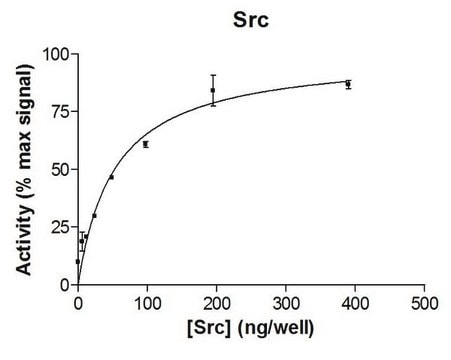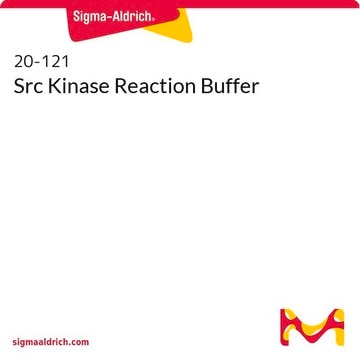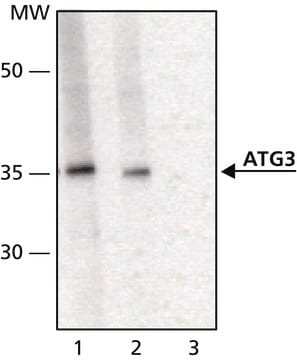S1076
SRC, active, GST tagged human
PRECISIO® Kinase, recombinant, expressed in E. coli, ≥70% (SDS-PAGE), buffered aqueous glycerol solution
Synonym(s):
ASV, c-SRC, p60-Src
Sign Into View Organizational & Contract Pricing
All Photos(1)
About This Item
UNSPSC Code:
12352200
NACRES:
NA.32
Recommended Products
General description
SRC proto-oncogene, non-receptor tyrosine kinase (SRC) belongs to the family of non-receptor tyrosine kinases. SRC was originally identified as a transforming protein of the Rous sarcoma virus (RSV) that had enzymatic ability to phosphorylate tyrosine in protein substrates. It contains an amino-terminal domain, conserved Src-homology domains (SH2 and SH3), a tyrosine kinase domain and the carboxyl-terminus. The gene encoding this protein is localized on human chromosome 20q11.23.
Application
SRC, active, GST tagged human has been used in the in vitro kinase assay.
Biochem/physiol Actions
SRC proto-oncogene, non-receptor tyrosine kinase (SRC) phosphorylates membrane proteins and nucleoproteins and activates various intracellular signaling cascades. It is overexpressed and activated in a large number of human malignancies and has been linked to the development of cancer and progression to distant metastases. In addition to increasing cell proliferation, a key role of SRC in cancer seems to be the ability to promote invasion and motility, functions that might contribute to tumor progression.
Physical form
Supplied in 50 mM Tris-HCl, pH 7.5, with 150 mM NaCl, 0.25 mM DTT, 0.1 mM EGTA, 0.1 mM EDTA, 0.1 mM PMSF, and 25% glycerol.
Legal Information
PRECISIO is a registered trademark of Merck KGaA, Darmstadt, Germany
Storage Class Code
10 - Combustible liquids
WGK
WGK 1
Flash Point(F)
Not applicable
Flash Point(C)
Not applicable
Certificates of Analysis (COA)
Search for Certificates of Analysis (COA) by entering the products Lot/Batch Number. Lot and Batch Numbers can be found on a product’s label following the words ‘Lot’ or ‘Batch’.
Already Own This Product?
Find documentation for the products that you have recently purchased in the Document Library.
Min Yu et al.
Microbiology and immunology, 65(1), 40-47 (2020-10-08)
The ischemia-reperfusion-induced damage in human brain microvascular endothelial cells (BMECs) is associated with disruption of the blood-brain barrier. CXC chemokine ligand 5 (CXCL5) is reported to be up-regulated in ischemic stroke. However, the detailed function of CXCL5 in this pathological
Fangfang Chen et al.
American journal of cancer research, 8(8), 1466-1482 (2018-09-14)
R428 (BGB324) is an anti-cancer drug candidate under clinical investigation. It inhibits the receptor tyrosine kinase Axl and induces apoptosis of many types of cancer cells, but the relationship between the two has not been well established. We investigated the
M S Collett et al.
Proceedings of the National Academy of Sciences of the United States of America, 75(4), 2021-2024 (1978-04-01)
Incorporation of phosphorus from [gamma-32P]ATP into protein was catalyzed by specific immunoprecipitates from avian sarcoma virus (ASV)-transformed avian and mammalian cells. This incorporation was observed only when antiserum from tumor-bearing rabbits able to specifically precipitate the ASV sarcoma gene product
Joel B Heim et al.
PloS one, 13(7), e0200558-e0200558 (2018-07-13)
Focal adhesion kinase (FAK) is an intensely studied non-receptor tyrosine kinase with roles in cancer and other common human diseases. Despite the large interest in FAK, the in vivo contribution of FAK auto-phosphorylation site tyrosine (Y) 397 to FAK function
Genomic imbalances in Schistosoma-associated and non-Schistosoma-associated bladder carcinoma. An array comparative genomic hybridization analysis.
Armengol G
Cancer Genetics and Cytogenetics, 177(1), 16-19 (2007)
Our team of scientists has experience in all areas of research including Life Science, Material Science, Chemical Synthesis, Chromatography, Analytical and many others.
Contact Technical Service








